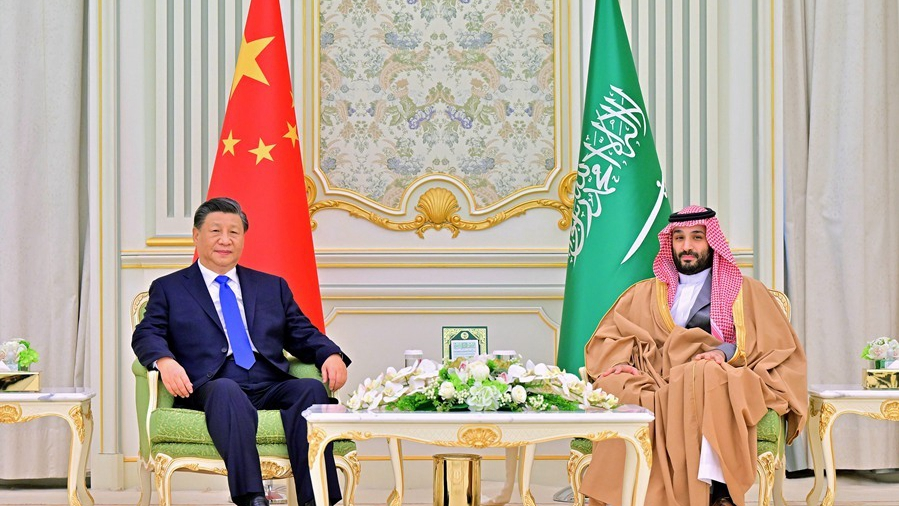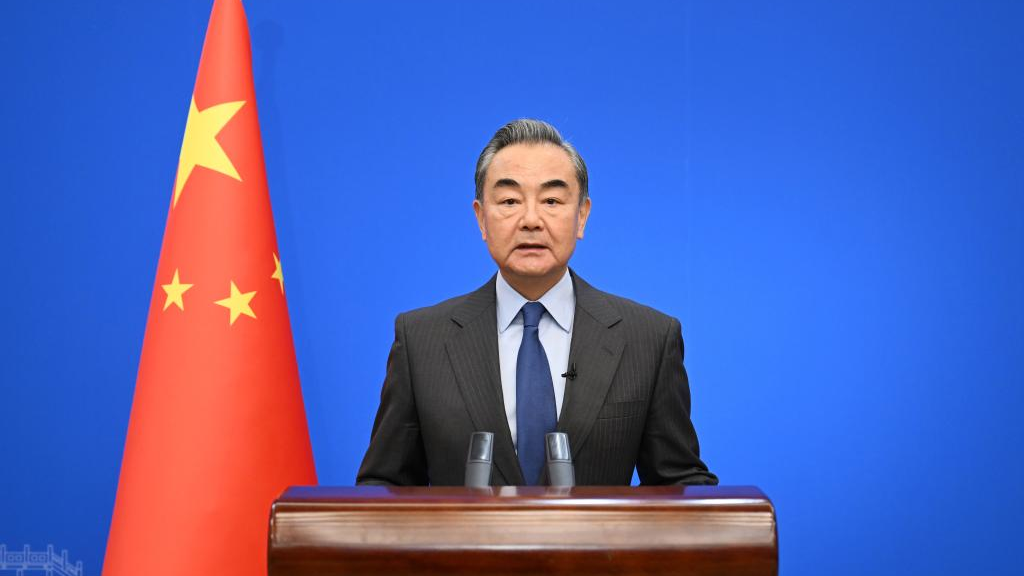
Chinese President Xi Jinping (L) meets with Saudi Crown Prince and Prime Minister Mohammed bin Salman Al Saud at the royal palace in Riyadh, Saudi Arabia, December 8, 2022. /Xinhua
Chinese President Xi Jinping (L) meets with Saudi Crown Prince and Prime Minister Mohammed bin Salman Al Saud at the royal palace in Riyadh, Saudi Arabia, December 8, 2022. /Xinhua
Editor's note: Mariam Shah is an Islamabad-based independent researcher in the field of conflict studies and military psychology. The article reflects the author's opinions and not necessarily the views of CGTN.
2022 proved a year of significant diplomatic success for China, scripting new chapters of global cooperation and collaboration. China has moved closer to Africa, Southeast Asia, and Gulf nations over the shared future agenda through partnerships, mega developmental projects, and trade deals.
While addressing a symposium on the international situation and China's foreign relations in 2022 via video link on December 25, Chinese State Councilor and Foreign Minister Wang Yi reflected that during the past year, China has faced challenges and pursued its diplomatic agenda with more persistence. Wang said, "We have conducted major-country diplomacy with Chinese characteristics in an all-round way, making new contribution to upholding world peace and promoting common development."
There are several significant achievements of China's major-country diplomacy, including "head-of-state diplomacy," which has been incredibly effective, setting the tone for China's broader diplomacy with one considerable development after another. China continued to "oppose bloc confrontation" and "zero-sum competition" while upholding strategic stability in relations with other powerful nations.
In addition, China has adopted an "open regionalism," creating a community with a shared future and a peaceful and prosperous Asia. Besides, as a significant power, China has demonstrated a strong sense of duty and mission in solving global concerns. It displayed renewed vigor in opening up and international collaboration, which presents excellent prospects for global economic growth.
Moreover, amidst all the challenges, China has not been intimidated by any hegemonic power or its bullying, has acted resolutely to safeguard China's core interests and national dignity, showed a commitment to serve the people through diplomacy, and has worked hard to protect the interests of Chinese nationals living overseas.
For decades, China has been focused on utilizing its diplomatic potential and soft power influence by supporting and initiating many multilateral developmental projects across the continents. From hosting the 14th BRICS Summit to attending the 25th China-ASEAN Summit in Cambodia and co-hosting the COP15 with Canada, China played an active role in addressing the global developmental projects and rising issues this year.

Chinese State Councilor and Foreign Minister Wang Yi, also a member of the Political Bureau of the Communist Party of China Central Committee, addresses a symposium on the international situation and China's foreign relations in 2022 via video link in Beijing, China, December 25, 2022. /Xinhua
Chinese State Councilor and Foreign Minister Wang Yi, also a member of the Political Bureau of the Communist Party of China Central Committee, addresses a symposium on the international situation and China's foreign relations in 2022 via video link in Beijing, China, December 25, 2022. /Xinhua
Other significant events included Chinese President Xi Jinping's visit to Saudi Arabia and the summits with Arab countries, which hold massive significance for the region. The visit was a success from all perspectives. The vision of a shared future and strategic partnership for China and Arab countries has entered a new phase cemented by the first China-Arab States Summit.
Besides, the Chinese attendance at the 48th session of the Council of Foreign Ministers of the Organization of Islamic Cooperation (OIC) in Pakistan was a definite sign that China and the Islamic world want a strong relationship. Chinese State Councilor and Foreign Minister Wang Yi said that China and the Islamic world strongly desire to build partnerships for "unity, justice and development" while attending the session.
Another very significant step by China facilitated many African countries. China took a giant leap when it announced to waive off 23 interest-free loans to 17 African countries. This pronouncement was in line with Beijing's foreign policy to help African countries hit by the global economic slump. It also reflected on China's efforts to build ties with developing nations, besides refuting the Western assertions that China is creating "debt traps" on the African continent.
Besides, China's perception among the African youth has been highly positive this year. Most African youths view China as the "most influential foreign power on the continent," according to a research by the Johannesburg-based think tank The Ichikowitz Family Foundation in June. As per the survey, young Africans "are seeing tangible, visible and very impactful signs of the role that China has played in the development of Africa." African countries also view China favorably, primarily because it offers finance, expertise, and a market at a time when Europe and the U.S. are not.
These are some glimpses from a successful year of Chinese diplomacy. All these events hint towards a new era of inter-civilizational cooperation based on mutual trust and collaboration under a new economic architecture free from unwanted liabilities. The present-day world is based on mutual interdependence and cooperation, which requires collaboration and not competition. Working with China comes with the fact that it doesn't view the world in zero-sum terms. China has always aimed for win-win cooperation and partnership with countries while always maintaining a non-interference policy concerning the country's internal matters.
The world cannot move forward with the mindset of "choosing between sides," polarization, and a zero-sum mentality. Nation-states need new arenas for trade and cooperation that can benefit all in the longer run. Like it or not, China is rising, and Asia is rising, as evident from the successful visits and diplomatic ties China has built this year. Rather than bifurcating the world in blocs, the global powers should focus on cooperation that can benefit sustainable peace and development all across the globe.
(If you want to contribute and have specific expertise, please contact us at opinions@cgtn.com. Follow @thouse_opinions on Twitter to discover the latest commentaries in the CGTN Opinion Section.)